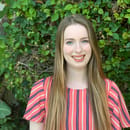As part of International Women’s Day, Her Campus at Cal Lutheran caught up with English professor Dr. Jacqueline Lyons. As an author of four books you may think Dr. Lyon’s was born with a passion for poetry and non-fiction, when in fact her love for writing came unexpectedly from a very different root in life. Dr. Lyons has always liked word play and as a child she would write tiny books with friends, but she never presumed that one day she would be a published author. I highly recommend you check out her books! – The Way They Say Yes Here, Earthquake Daily, Lost Colony and Adorable Airport.
Her Campus at Cal Lutheran: Did you always want to be a professor?
Dr. Jacqueline Lyons: Always… question mark. The way I became interested in teaching really was first I joined the Peace Corps. I wanted to join the Peace Corps because it was a way to go far out into the world. What you do when you join the Peace Corps unless you know medicine or agriculture, is you teach. So that was my first experience teaching. First really I fell in love with my subject, with English and all literature especially poetry and then creative writing and then I started teaching it. Those two experiences combined really pointed in one direction which was to become a professor of English and creative writing.
HCCLU: What is your favourite type of writing/reading and why?
JL: Poetry closely tied with literary non-fiction. Those are the two genres that I write and publish in and the two that I teach the most. I like how they open up, think about language and how those genres just allow a different vocabulary for thought and a different way of describing experience. When I say different I mean different than the everyday sentences or news reporter voice.
HCCLU: How does poetry relate to us as humans and in particular women?
JL: One of poetry’s powers is to connect across time and space. I always emphasize to people in writing classes that ultimately you want to communicate something and of course how we’re communicating, it differs a lot when we do creative work. It’s not necessarily objective fact but ways of looking at the world. That makes poetry seem very relevant to women across the world connecting to each other. To connect with the imagination, not only as part of the facts of our lives.
HCCLU: What would you say to other female writers that one day want to have a published book?
JL: Especially women, I would say to read a lot of women, because although curriculum is much more balanced now in terms of gender it’s still in our whole culture so weighted towards the male voice. If we really want to get some kind of balance with voice, we almost have to in our own lives read ten times as many women as men because we’re going to get more male voices. So one bit of advice is to seek out other female voices past and present as good mentorship and example. For publishing, maybe nothing is so gender specific. I would say worry first about writing well and worry a little bit later about publishing because it changes how you look at your work and think about writing. You don’t want to invite that editorial voice into your head too soon.
HCCLU: How does it feel to have your work published?
JL: It’s so satisfying. I always think it shouldn’t be the only measure or the only reason to write but after you spend years writing a book and especially if you think people might like it or there’s something valuable in it, you want other people to see it. So it’s great to have it published!
HCCLU: Do you think there are enough female voices?
JL: I’ve watched there be more female voices especially in poetry. It’s much more balanced than it used to be but there’s probably many unpublished voices too.
Dr. Lyons with her niece on a roadtrip she took to Arches National Monument in Utah
HCCLU: Why do you like poetry?
JL: It’s the closest we come to saying what’s impossible to say. To me a good poem, whether it’s one I read or write is one that really pushes the limits of language and expression. It captures something from the imagination or the sub-conscious that’s hard to capture in words. I love that power of poetry.
HCCLU: You have one book to tell everyone to read, what would it be?
JL: I love/hate that question! I have lots of favorite books and they change, but in desert island situation I might choose something like the collected works of Emily Dickenson because it’s a big book, she wrote many, many poems and she’s also such a singular voice. No one else writes quite like her. So I’ll read and teach her a lot and then drift away, but so far I keep coming back to her.
HCCLU: Do you have a favorite quote?
JL: There are a few quotations that I’ve put on syllabi that come to mind. But Emerson said “all language is fossil poetry” I like to be reminded of that.
HCCLU: How long have you been at Cal Lutheran?
JL: This is my eighth year.
HCCLU: What did you do before you came to Cal Lutheran?
JL: I had several short term teaching jobs. I did an MFA in creative writing, then I did a PhD of literature and creative writing, emphasis in poetry. Then I taught for three years at UNLV (Nevada, Las Vegas) and then another short term job of three years at Washington State University before I came here.
HCCLU: What do you like about teaching?
JL: Teaching is challenging in a lot of ways. I suppose that’s obvious but at different times I’ve liked the challenge of figuring out how to teach a particular book, how to help people like it and connect with it but also how to show people it’s importance. And other times I’ve been really focused on how is it that people learn and apprehend new information. So both of those are really satisfying and then creative writing especially to get to create with other people. That’s hands down my favorite part of teaching.
HCCLU: What have you learned from your CLU students?
JL: That’s a good question! I feel like people at the age of undergraduates now have grown up in a culture that really encourages them to notice what makes them happy, what they like. So in some ways, I’ve learned a lot about how much self-awareness students here bring to their whole lives and of course their undergraduate experience as well. I’ve seen a lot of good writers here so I suppose I’ve learned something about variety of writing, though I encourage that anyway when it comes to teaching. My own preferences are maybe a little bit narrower in my private time but when I teach I encourage people to sample really widely so then in return I get this great variety of writing.
HCCLU: What’s one of your favourite parts of being an English professor?
JL: That I get to talk about books with my students as a center part of my work! To me reading is such a huge pleasure and also vital to the human experience. We learn a lot about being human from reading other people’s really careful inquiries and observations about the human experience in the form of literature. What better way to spend a lot of time than look at that?
All Photos Courtesy of Dr. Lyons



